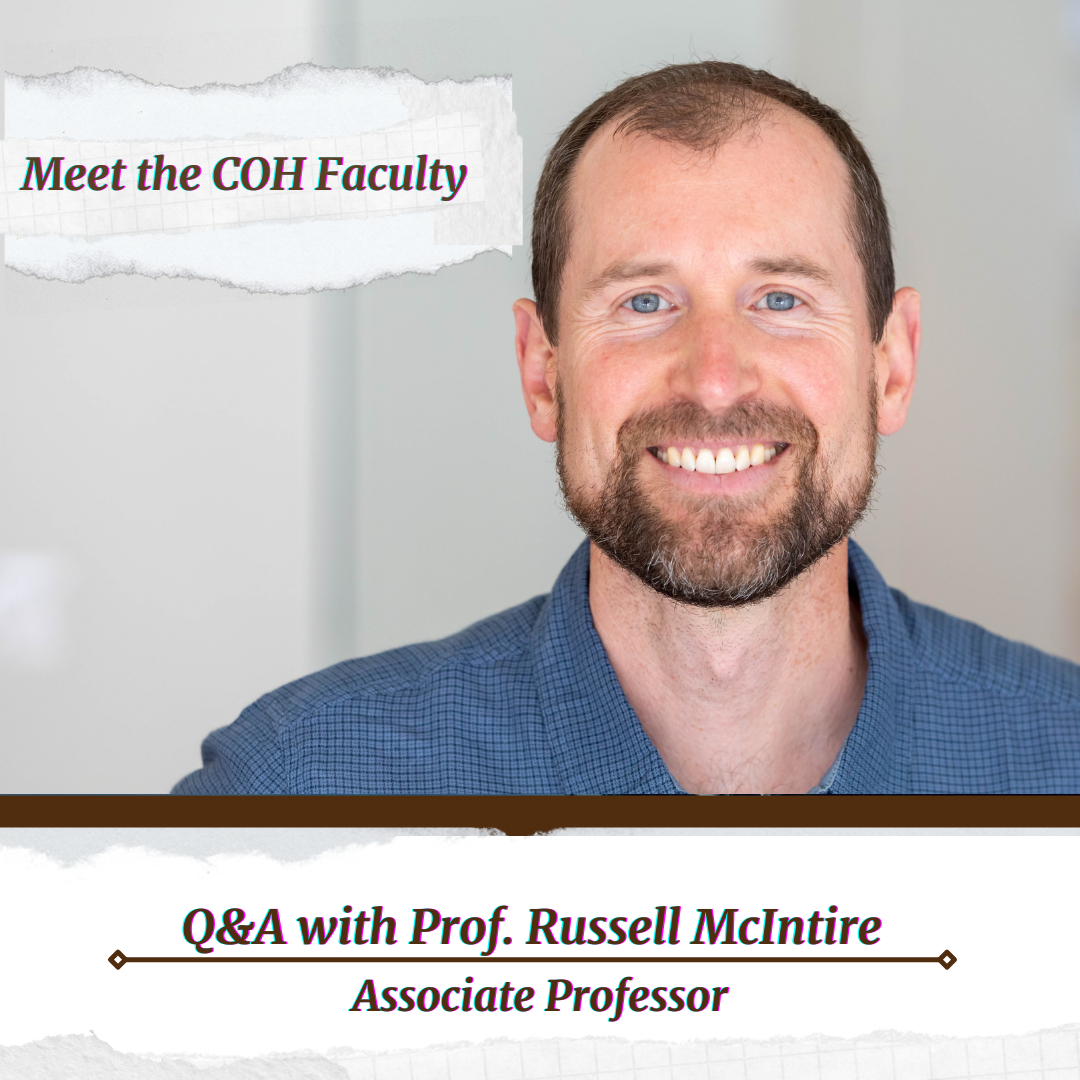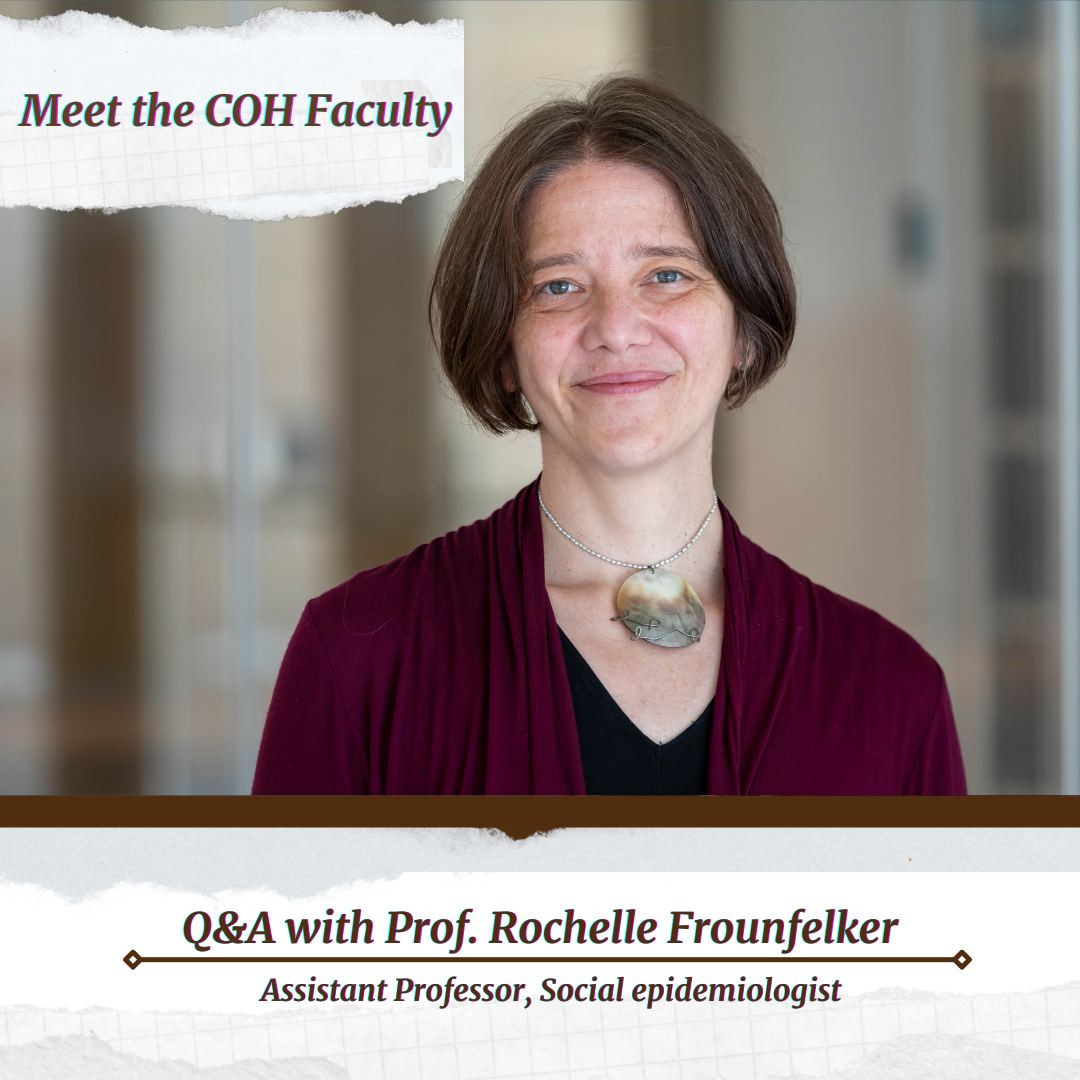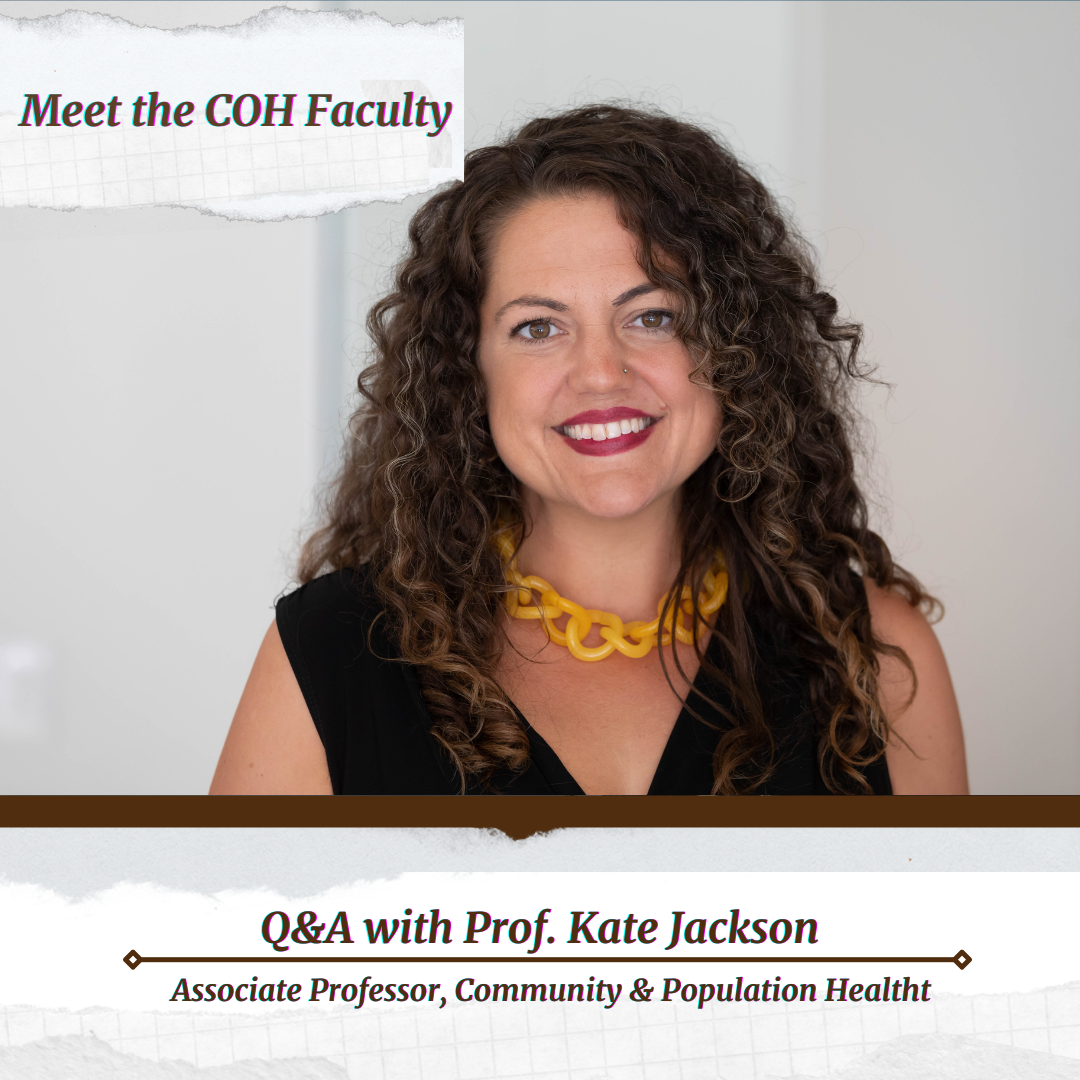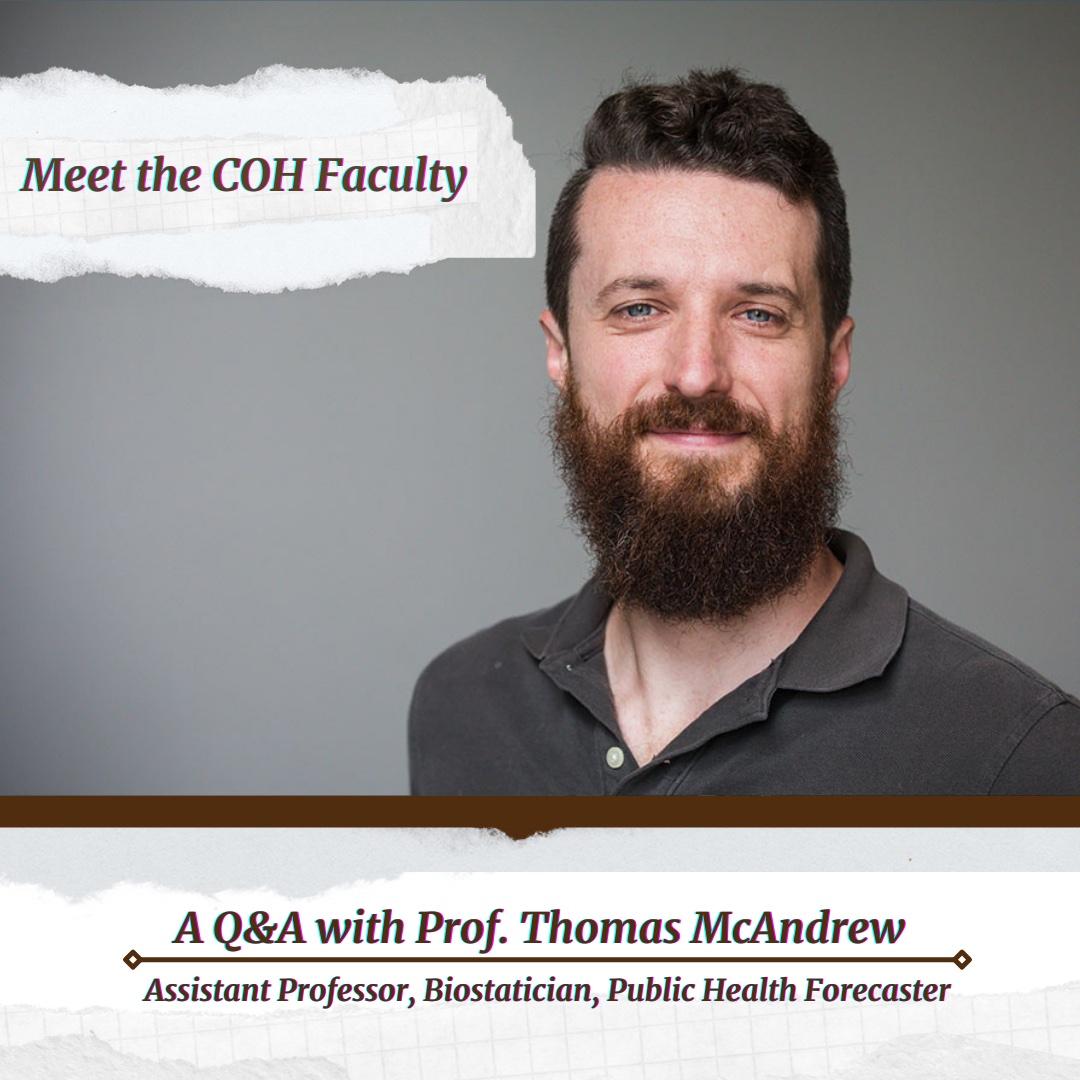
Faculty Profile: Meet Russell McIntire
By Max DeCaro '25
Dr. Russell McIntire is an Associate Professor in Lehigh University’s College of Health. Dr. McIntire grew up in the Suburbs of Philadelphia in Bucks County, PA. He obtained his B.A. in Biology and Environmental Studies at Case Western Reserve University, and his MPH in 2008 and Ph.D. in Health Behavior in 2013 at Indiana University Bloomington. Dr. McIntire is an epidemiologist with an interest in chronic diseases. His research is focused on the built environment and how it affects chronic diseases among populations. Much of his work focuses on green spaces and how they can influence human health.
What did your educational journey look like?
McIntire: Growing up in the Philadelphia area, I knew that I liked service and serving people and organizations, and that interest in service continued into college. I went to college at Case Western Reserve University in Cleveland, OH, and I was pre-med. I knew that I wanted to work on improving people’s health, so I was a biology major and an environmental studies major. I’ve always been interested in the interactions between people’s health and the environments in which they live, whether it be specifically ecology or urban or rural environments.
I always did service throughout college. I did a summer tour with Americorp in Cleveland, and instead of going straight to medical school from undergraduate, I decided to do a full years-long tour with Americorp which placed me back in Philadelphia in a primary care health clinic in North Philadelphia. I was in the outreach staff and it was a brand new health clinic, so our task was to talk to people in the neighborhood and try to get them to come into the clinic for primary and preventative services. That experience, meeting the wonderful neighborhood and community organization members, really showed me that I wanted to focus not on the health of individuals as a doctor but on community and population health — on how we make our environments the healthiest for individuals and how we can change our environments to reduce the dramatic health disparities that we see especially in urban areas.
So that got me on the path of public health, and I researched the degrees in public health. Instead of going to medical school, I knew I wanted to be a public health practitioner. I decided on a Master of Public Health program back in the Midwest in Bloomington Indiana at Indiana University, and I really loved the public health curriculum. Epidemiology, community health, health behavior and theory, health policy — all of these topics really spoke to me, and I saw them as tools that could be used for improving the health of populations and making a difference. And I loved it so much that I stayed on to do my Ph.D. at Indiana Bloomington.
My topical focus at the time was on tobacco control, and I focused on this because it is still the greatest cause of preventable death in the world. I have been interested in tobacco control ever since and I have had a lot of great opportunities to do studies on tobacco control. Most of these had a strong element of place: where you live, where you work, where you socialize affects your health, and so that’s how I got here and how my education has had the impact it has on my work now.
Q: What did you do before joining Lehigh?
McIntire: My first faculty position was at Thomas Jefferson University (TJU), in the Jefferson College of Population health, and it gave me an introduction to the medical system and the importance of primary care prevention and practitioners in secondary prevention. A lot of the research that I was doing there was focused on cancer, and I developed strong ties with researchers at the City of Philadelphia and the TJU Sydney Kimmel Cancer Center. We did epidemiological projects to describe the distribution of many cancer outcomes, especially in Philadelphia. A lot of that, again, got me thinking about neighborhoods and how neighborhood resources, experiences, exposures, and socialization can influence the health of individuals.
Q: What influenced your decision to come to Lehigh, and how has that transition been?
McIntire: The transition has been great, I really like working at Lehigh. It is a welcoming environment. I wanted a research infrastructure where I could dedicate of my time to research, and I wanted to be in an area that was beautiful and to be associated with a university that likes community partnerships and is civically engaged since a lot of my research is community-based. I think that I found that in the College of Health.
Q: Has the greater Lehigh Valley surprised you? If so, in what ways?
McIntire: So, I haven’t moved yet, but I am looking for a house and eventually my family and I will move up. It has surprised me, I didn’t know too much about the Lehigh Valley until I started researching for this position, and what has surprised me is how the Lehigh Valley has such a diversity of cities and areas. There are very distinct areas that are rural, urban, suburban; and also, it is very beautiful, and the landscapes are very beautiful. Given my research interests I love the outdoors, and there is so much opportunity in the Lehigh Valley for that.
Q: What is the focus and context of your research?
McIntire: I am exploring research projects that measure the impact of green space on human health. Many of my studies are large and use big data: large scale surveys, secondary analysis. I look for large-scale relationships between exposure to green space and human health, and that health may be measured by self-reports in surveys, electronic medical records, or some other source of data. For example, I have recently worked on a project that is looking at exposure to green space in Philadelphia and self-reported mental health, and how that relationship changes for different demographics of people. Large scale epidemiological studies are one major category of research projects that I work on. I also work on greening interventions, and these are the really fun types of studies. In these I get to evaluate the impact of the creation of green spaces on human health and the people who use those spaces. I am researching the work of an organization that works with communities to transition abandoned lots in Philadelphia into community parks, and what is cool about this is that the organization works directly with the community members to design the parks, including the functions of the space that they want. That organization is called “Park in a Truck,” and it is called that because they work with the community to design the part and then the components of the part are rolled up in the back of a big flatbed truck and the community members come out and help assemble the park and maintain and program it once it’s assembled. I am also working with a hospital system that has a farm on their campus. We are working to evaluate the impact of the farm on the mental health of the workers in the hospital.
Q: How do you think working with community members has impacted your work?
McIntire: It’s harder to work with community members on research, because you are dealing with the timeline of community members, but it is more satisfying because you see the direct impact of your results and you are creating something that can be practically used for community members and the issues that they want to address. And you also find that your outcomes are more accurate as you are utilizing the knowledge that is contained within the experience of the community members.
Q: What classes are you currently teaching, and what classes do you plan on/hope to teach in the future?
McIntire: I teach epidemiology classes right now, including epidemiological methods. The classes are wonderful, I love working with students and teaching them how to measure health outcomes, it’s phenomenal. I would like to in the future develop a class that is focused on green space and health, and instead of one that is strictly from an epidemiology textbook, have students read journal articles that reflect the cutting edge research in this area. I also like to include students in my data collection and projects. I have many projects in which I could use students’ help, especially during the warm months when we can collect data outside. A cool project that I am doing right now with my EPI305 class is on park auditing and collecting data on the quality of parks in Bethlehem, and we are going to try and use that data to identify linkages between the quality of parks and health of people in that area.
Q: What are your hobbies?
McIntire: I like sports and playing sports; I have a ten year old daughter so we play a lot of sports together. I like rock and roll music and woodworking — it is a hobby that I really love. And I love hanging out with my family.
Q: Cats or dogs?
McIntire: That’s a hard one! I would say both, but I currently have a dog, she is a two year old German Shepard lab mix named Ginger. So if I had to choose one I would choose dogs because I love my dog Ginger.


